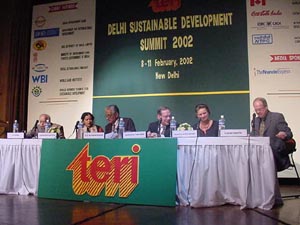
Agenda 21 emphasized the need for equitable
development and environmental protection, with sustainable livelihoods as a core issue.
Sustainable livelihoods encompass enhancement of resource productivity and security of
assets, resources, income-earning activities, and food. They are undermined by
environmental degradation, lack of social infrastructure, and poverty.
In implementing Agenda 21, particularly with
reference to poverty alleviation and ensuring sustainable livelihoods, the crucial factors
are globalization trends, policy reforms, funding, public participation initiatives, and
awareness.
Globalization has engendered concerns like
rapid lifestyle changes and cultural upheaval indeveloping countries. An instance is brain
drain—exploitation of assets with no return to source countries.
Post-Rio, policy reforms have not adequately
recognized the poor. The marginalization of social and environmental ministries vis-à-vis
the economic ministries in India is a case in point. The bureaucracy continues to be a
bottleneck in the implementation of most initiatives as it is far removed from the
grass-roots reality.
Funding has focused on military security
rather than environmental and social security. Sustainable development programmes suffer
from inadequate financing. Aid commitments are often not fulfilled; in some cases, ODA is
mismanaged.
Effective and accountable local institutions
at the grass roots are preconditions for ensuring food production and livelihoods,
particularly in developing countries. Their efforts must be reinforced through dedicated
scientific and social support.
Education and awareness, particularly
environmental, contribute to capacity building, reductionof vulnerability, and instilling
a sense of responsibility towards larger environmental issues. Developed countries must
also recognize these responsibilities.
People should be aware of, and know how to
demand, their fundamental rights. Community participation evokes practices and learning,
which must be ploughed back for enhanced management.
Institutional mechanisms to guide and monitor
Agenda 21 implementation at various levels include good governance; public participation;
innovative fund-raising mechanisms; unrestricted movement of trained manpower (with
returns to source countries akin to levies on capital transactions); and goal orientation
and coordinated functioning.
|